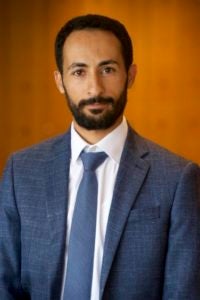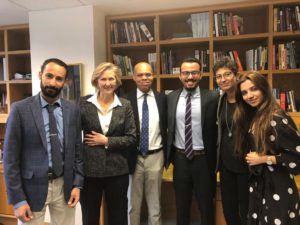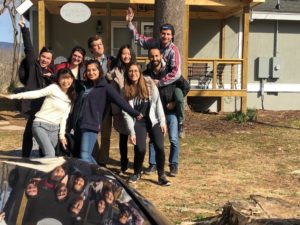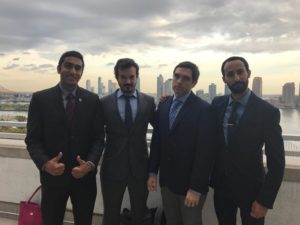Title: Mohamed Elmagbri (MSFS’19) Looks To Use Lessons Learned at MSFS to Strengthen Governance in Libya

At a Glance
Hometown: Benghazi, Libya
Concentration: International Development
Favorite Class: Comparative Regional Economic Development with Martin Staab
Summer 2018: Internship in D.C. with the Governance Technical Support Unit, Mercy Corps
On-Campus Activities:
Research Scholar, SFS Scholars Program, MSFS Class Speaker
Non-GU Activities:
Consultant with Palladium on Public Financial Management, Consultant with Counterpart International on Local Governance and Civil Society
Mohamed Elmagbri (MSFS ’19) arrived on the Hilltop with an extensive background in governance and civil society, having worked as a research consultant for organizations such as the United Nations Support Mission in Libya, the EU Delegation to Libya, and the World Bank. Despite this experience, Elmagbri found the interdisciplinary nature of the MSFS curriculum to be extremely eye-opening. “MSFS brings together different, yet interconnected areas of studies through its diverse course offerings,” he says. Elmagbri hopes to eventually use what he’s learned at MSFS to strengthen governance in his home country of Libya.

In Comparative Regional Economic Development, Elmagbri and his classmates were tasked with studying the development challenges facing each region in the world. “I always read and followed the political dynamics and trends of the different regions of the world, but with this class, we studied these regions through development economics lenses.” Elmagbri likens studying both political and economic trends to “overlaying two maps on each other.” “It is fascinating how the two are interlinked and reinforced each other,” he says. It was this very emphasis on interdisciplinary studies that drew Elmagbri to the SFS in the first place.
“I personally focus on governance in fragile and conflict-affected countries which is an intersection of political, economic and social studies,” he says. “After looking at all the courses offered by different programs, MSFS was the only program that had classes that captures the multidimensionality of concepts such as governance.”
The interdisciplinary curriculum has affected how Elmagbri approaches issues of governance. “I now see other aspects of governance that I was not realizing the significance of before, such as the role of private sector, the effects of natural resources particularly in a country like Libya, and state-society relations,” Elmagbri says.

When asked what most surprised him about Georgetown, Elmagbri highlighted the diverse experiences brought by his classmates: “Almost everyone in the program had worked or at least interned somewhere before or during MSFS, and these experiences enriched the class discussions and debates.” Elmagbri remembers returning to Georgetown for his second year being fascinated by the stories that his classmates shared. “I do not think there was a region in the world where we did not have an MSFS student interning over the summer. It was really phenomenal.”
The diversity of experiences and skills among the student body did not just manifest itself in academic and professional contexts. Some of Elmagbri’s finest memories on the Hilltop came during MSFS International Night, where students performed for their peers through a variety of mediums. “It was a time when I realized that we not only have great minds in this program, but also other talents, from singers and professional dancers to actors and comedians.”
Elmagbri valued how helpful and invested the professors were in the lives of their students. “Professors are always willing to help students with either academic, or professional matters vis-à-vis career networking,” he says. He cites Professor Erwin Tiongson and Professor Nicole Bibbins Sedaca as being particularly influential. “They both were phenomenally great mentors who constantly guided me in my academic and career decisions.”
While not in class, Elmagbri and his wife, Amena Albasiuni, came up with a plan to make sure they took in as much of D.C. as possible. “My wife and I decided to have a dinner out every week and try a different restaurant every time. We both found this is the best way to engage with D.C.”

What Elmagbri will miss most about Georgetown is, simply, “everything.” “We spent the past two years studying and working together, and my wife and I became very attached to this community,” he says. “I will miss reading and writing about matters that I care about.”
Looking forward, Elmagbri hopes to strengthen governance in Libya by working on issues such as “institutional capacity, economic reforms, and improving service delivery.” “In the long run, I see myself establishing a ‘Do and Think Tank’ in Libya to conduct research on different governance issues and devise programs to address these issues,” he says. “I also see myself working with the Libyan government to help them improve governance systems in Libya.”
In the short term, after graduation Elmagbri will be moving to Tunisia to “help international organizations understand the complex issues of governance in Libya and develop better strategies to address them.” “I chose Tunisia as it is the place where all the development organizations who are currently working on Libya are based due to the security situation,” he explains.
Elmagbri says that his time at Georgetown did not change his interests, but rather better defined them—and empowered him to pursue them. “I have the knowledge and set of skills that will enable me to contribute to building effective governance in Libya.”